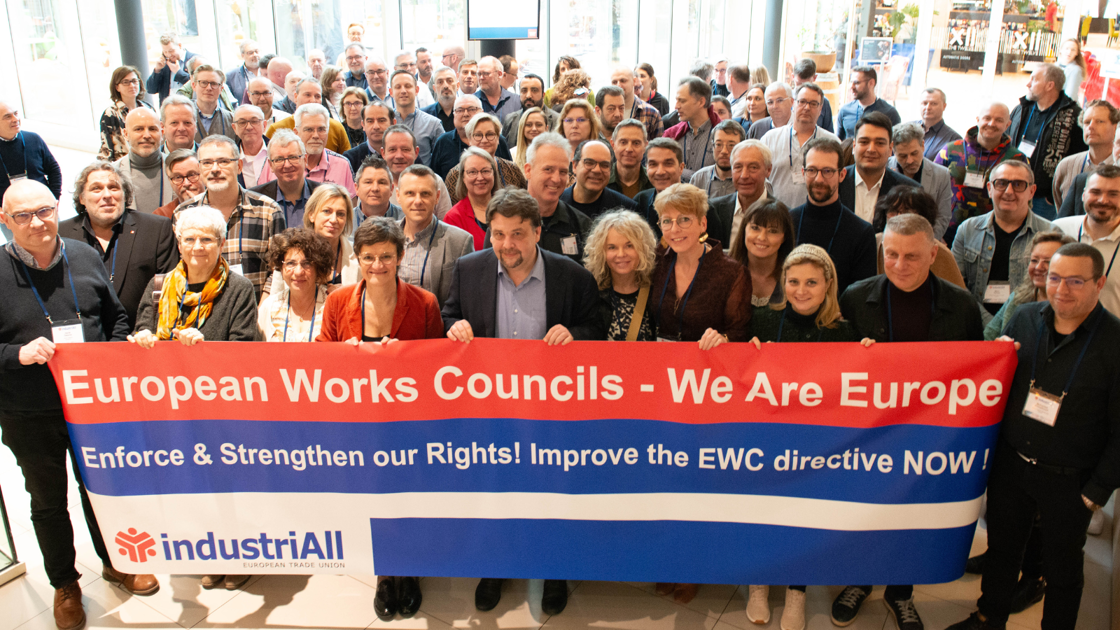On behalf of the 7 million workers industriAll Europe represents as well as the trade union representatives active in the +650 European Works Councils from industrial sectors which we assist on a daily basis, we call you to support MEP Dennis Radtke’s effort to clarify that all EWCs’ rights to be informed and consulted on transnational corporate decisions before they are made are secured.
European Works Councils’ rights must be urgently improved for social dialogue to drive Just Transition in multinational companies. Faced with the massive challenges posed by the green and digital transitions in a context of multiple crises (energy, inflation, unfair trade, wars…), European industries are at a crossroads. It is estimated that the jobs of 25 million industrial workers will move, change or even disappear as European societies decarbonise. IndustriAll Europe has long advocated for genuinely just transitions that deliver quality jobs in thriving new and renewed industries. A Just Transition can only materialise if workers are on board: Nothing about us without us! No strategic corporate decision without social dialogue!
European works councils are nowadays representative bodies of invaluable importance. When correctly established and well-functioning they play a crucial role in protecting quality jobs and working conditions while ensuring long-term companies’ sustainability and a fair anticipation and management of change. At the same time, EWCs are often perceived by actors at company level as a unique opportunity existing thanks to the social acquis that EU delivered for workers.
Unfortunately, as substantiated by extensive research evidence and confirmed in the Commission’s assessment, all too often in practice information is inadequate and consultation remain ineffective as it takes place too late when company decisions are already taken. What is more, interpretation of key directive’s provisions continues to prove difficult, enforcing rights is still challenging and dissuasive and proportionate sanctions are lacking in a majority of cases.
Only 20% of existing EWCs operate according to the letter and spirit of the Directive. There is no one single day without us receiving complaints about rights stemming from an EWC agreement or national transposition law being challenged by a management. On numerous occasions, we have brought blatant cases of breach of EWC’s rights to the public knowledge since the Recast Directive came into force, be it at Caterpillar, ArcelorMittal, Alcoa, Whirlpool, GKN, Honda, Nissan, Thales, Wärtsilä, Novartis… It took two years for the British Airways EWC to know which Spanish court is genuinely competent to rule its case. It took a complaint at the local police station of the little Finnish town of which the Nokia CEO was a resident for the EWC to claim for redress. It took a complaint to the European Commission for infringement of the EWC Directive by the Irish legislation for the Kingspan EWC to eventually be set up. We can no longer accept that the mere respect of EWC rights remain such a daily struggle for the vast majority of EWCs thirty years after the EWC Directive saw the light of the day!
We want to reassure management willing to engage into meaningful dialogue with European works councils that they have nothing to fear from the proposed improvement to the EWC Directive. Decision making is not weakened nor delayed but improved when quality and constructive information and consultation take place. Eurofound research evidence demonstrates that democracy at work does delivers both greater industrial competitiveness and job quality . The amendments proposed by the EP Rapporteur are mostly targeting the clarification of existing rights and how to enforce them based on existing national practices such as the right to suspend a transnational project until the EWC has been properly involved (preliminary injunction). There is no intention to reinvent the wheel nor create rights which did not exist before.
A positive vote from the EMPL committee will send a strong signal to the +15,000 worker representatives sitting on the +1,000 existing EWCs across all sectors as it will mean that their voice matters, their concerns have been heard and that the EU does promote responsible business practices which include strong social dialogue. We call on you to send such a positive signal to the millions of workers whose interest are defended in EWCs and whose vote in two months will determine the future of Europe.
